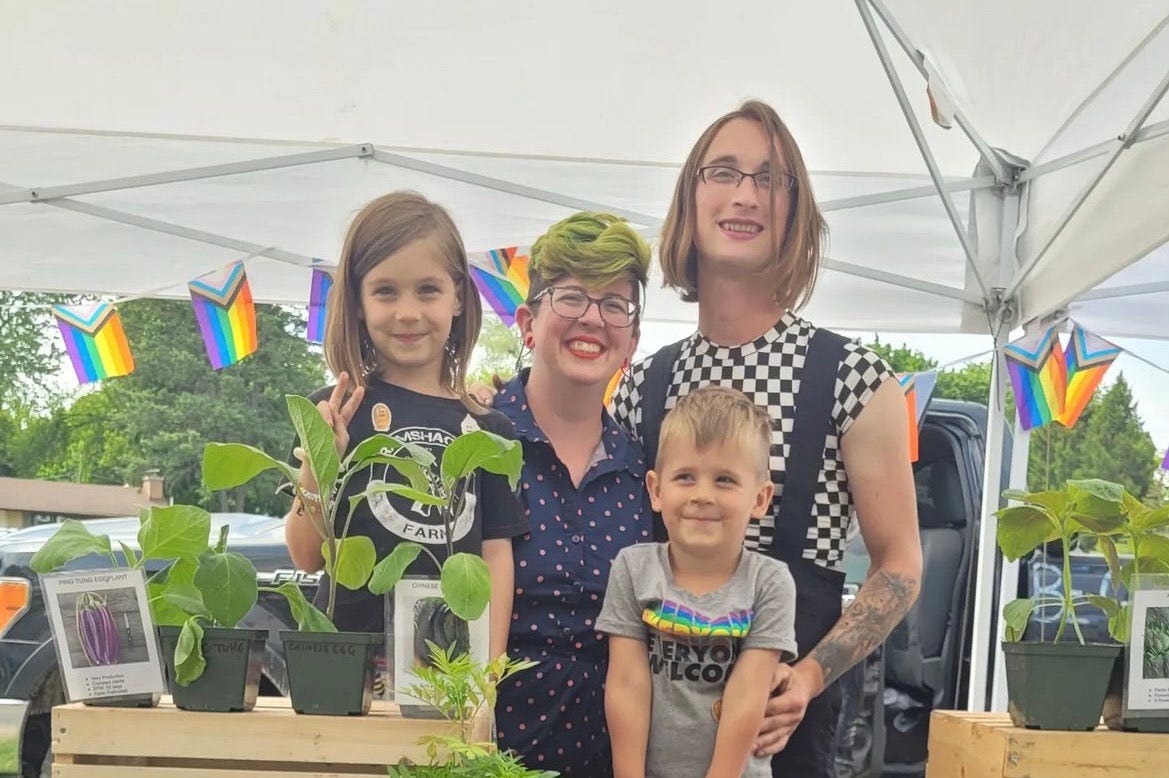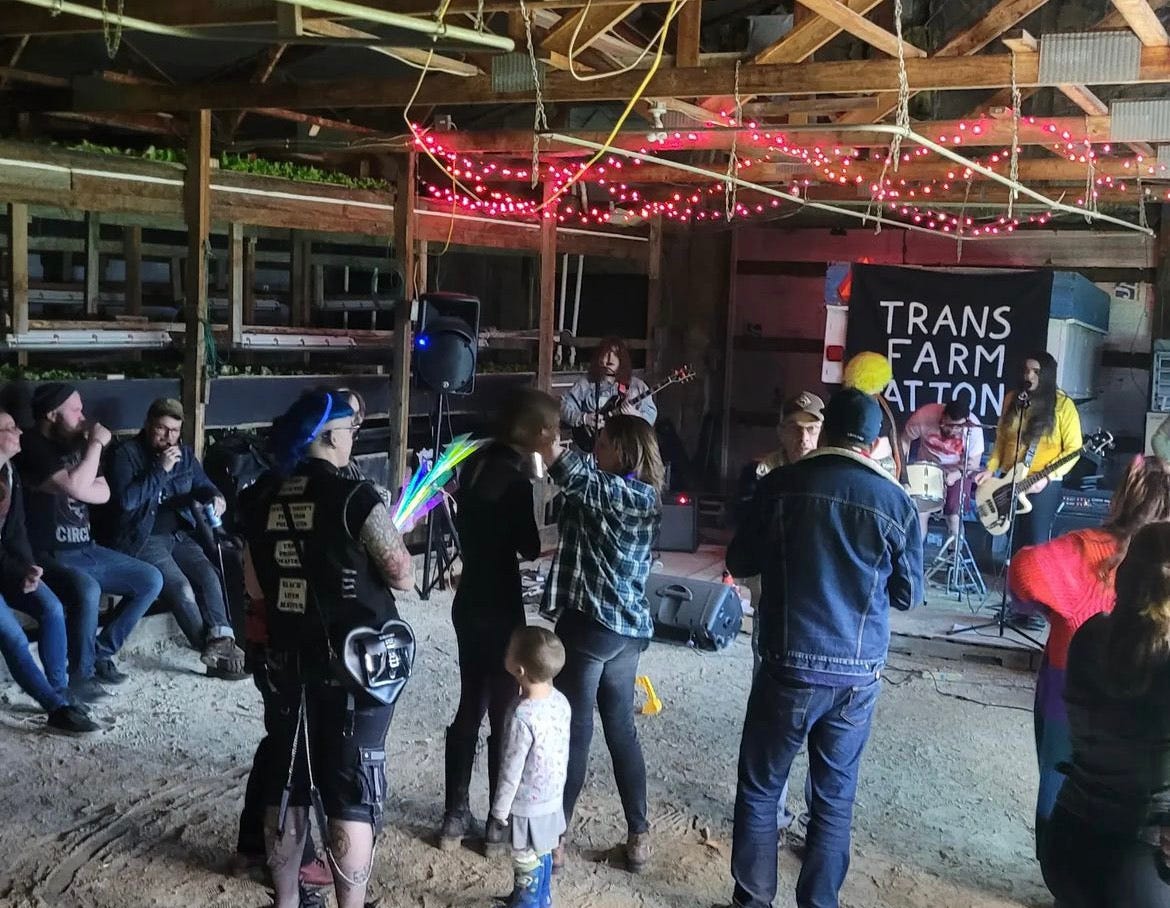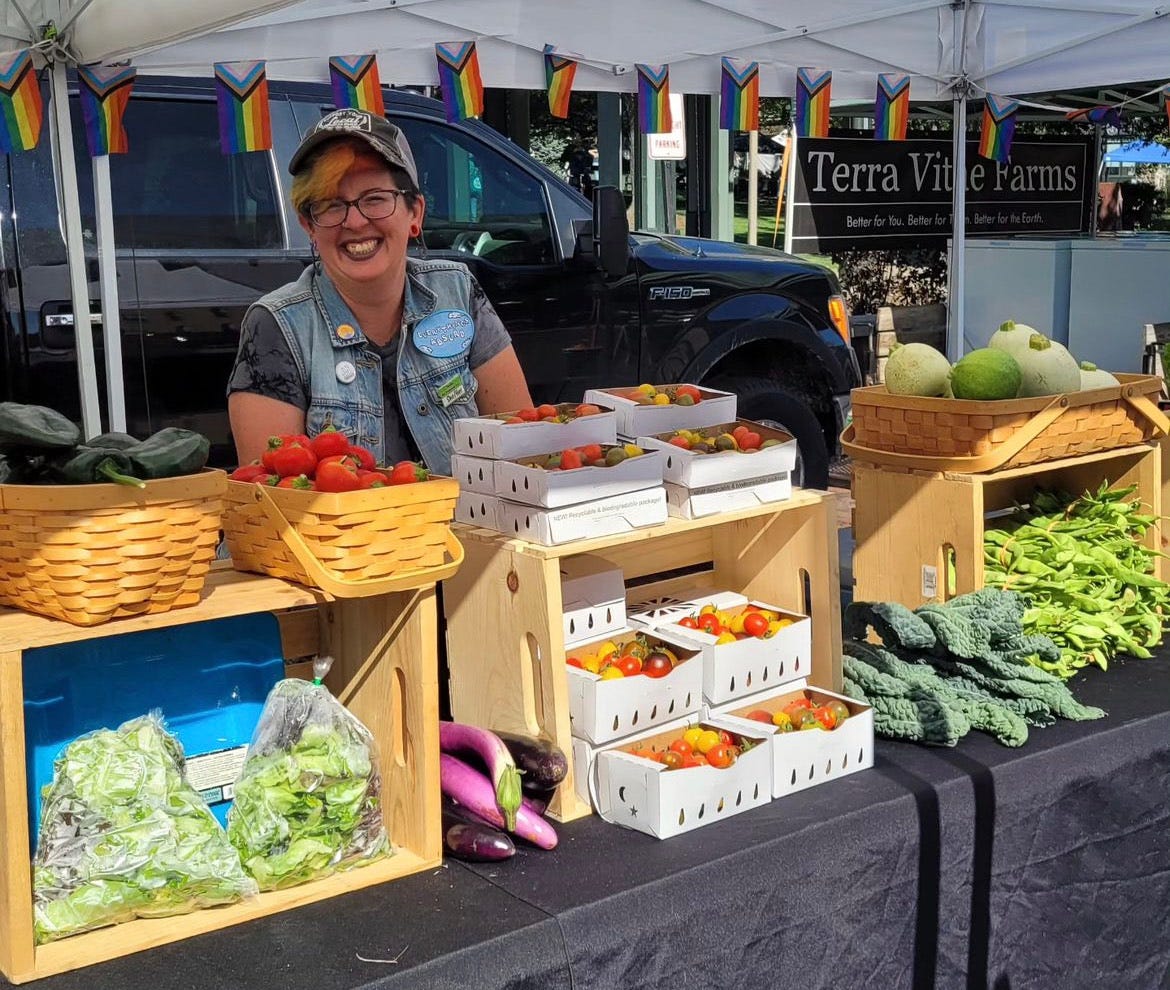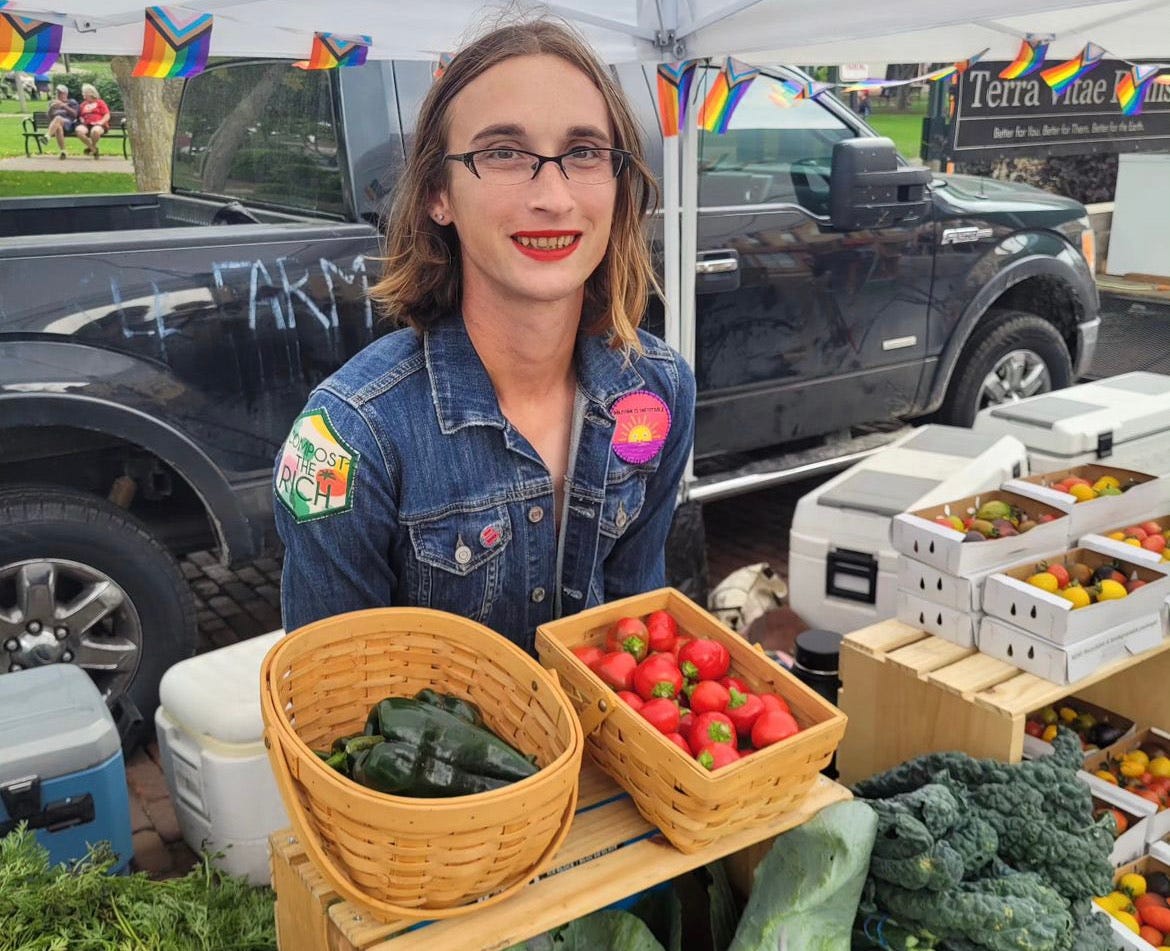queer punk farmers are the future, and the future is now.
I spoke with the farmers behind Harvard’s Ramshackle Farm about what queer visibility means for a town and industry that’s seen little of it.

Queering the Burbs is a regularly-published distillation of pop culture, politics and queerness written by Joe Erbentraut. If you like what you see, please consider subscribing (it’s free!), liking or sharing this piece.
Whenever I’m asked to participate in a “two truths and a lie” game in a corporate team-building setting, here’s my go-to “fun,” yet surprising fact: I grew up raising dairy cows on a farm in rural southeastern Wisconsin.
The farm was small, but we didn’t just have cows going on. At various points in time, we also grew apples, raspberries, and even a few pears. Each fall, the apple cider press would get pulled out into the front yard so suburbanites could cross the state line to pick their fresh apples and see it processed before their very eyes into that sweet, tangy nectar of the season.
Of course, even at our small scale and at my young age, the farm wasn’t all sweetness. There were also early mornings tending to the cows, late nights chasing after an escaped calf, and lots of manure scooping in between. Farming is a lot of incredibly taxing work, and the pay does not come anywhere close to matching the level of pure exertion the work entails.
As I got older, my passions and career lured me away from that rural setting, but eventually my farming past caught up with me when I found myself zeroing in on food, water, and agriculture policy as my beat of choice as a senior reporter at HuffPost. In that role, I wrote about how major issues like climate change and our absurd immigration policy impact farms, and was even able to force my radical pro-lesbian farmer agenda onto our readers.
All of that is to say that when I learned about the incredible folks at queer punk Ramshackle Farm located in McHenry County just a 25-minute drive from the farm I grew up on, I knew I had to talk to them. The other week, we finally made it happen.
Ramshackle Farm is a five-acre family farm located in Harvard, Illinois that consists of a 5,000-square-foot hydroponic facility and a one-acre market garden where vegetables are grown without the use of pesticides or synthetic fertilizers. On their farm, Eve and Shannon Mingalone produce a colorful array of pesticide-free crops including carrots, tomatoes, cucumbers, broccoli, peppers, lettuces, squashes, beans, peas, beets, and I could go on and on with the garden gorgeousness that adorns their Instagram grid.
The fact that the Mingalones’ farm is a proudly queer-run farm is decidedly not the norm for the industry. As this in-depth Wisconsin Watch story that also highlighted the Mingalones reported last year, the industry has long been dominated by straight, male, Christian, conservative norms. Even the nation’s largest agricultural lobbying group, the American Farm Bureau Foundation, has ratified policies as recently as last year that affirm antiquated and insidious anti-LGBTQ+ organizational stances.
Their farm also stands out from the crowd because the vast majority of agriculture businesses in their county (and the nation as a whole) grow commodity crops like corn and soybeans grown using “conventional” methods (i.e. pesticides and synthetic fertilizers), while just 2% of the nation’s farmland is used to produce fruits or vegetables. Put simply, there just really aren’t many other farms like Ramshackle in this world, but the industry would be in a much better (and more sustainable and climate-conscious) place if there were.
None of all this seems to bother the Mingalones all that much or, at the very least, they’re just too busy to spend too much time thinking about it. After all, they’ve got a community to feed and plenty of other things to worry about.
I recently spoke with the Mingalones about how they got into agriculture, what it means to be a queer punk farm, and what the act of queering an aggressively cis-het industry means to them. Our interview has been edited for length and clarity.
How has this season been going for you? Is this your second year in operation as Ramshackle?
SM: Yes, this is our second year in this location. I think just across the board this year has been a hard year for farming, weather-wise, all of that. Even just home gardeners are like, “What the fuck is going on?” I don’t know. But even with all of those challenges of the cold overnight temperatures and all of these things happening, when we look at what we’ve accomplished this year, the amount of growth that’s happened is pretty substantial I would say. Just in terms of the numbers and what we're able to do and what we're able to produce. Actually almost more encouraging than anything is we're still fucking up a lot. And so if we're doing this much better this year in a hard year, in a hard climate year and still messing a lot of things up, what does that mean for the future? It's pretty good.
Tell me a bit about how you first got into farming.
EM: I got really into reading books on farming [at one point]. Shannon's always been a big gardener, and I don't even know how I ended up [doing that] but I started reading books about farming, and then you go on Zillow or whatever and you just look at random properties…
SM: And this is within the context of the pandemic, and we were both full-time retail workers. We were both working at Trader Joe's in retail grocery during the pandemic. And so that led to a lot of [questions like] what if we just moved away? What if we just moved to the woods?
EM: I came home one day and I was like “we can make money from farming.” Turned out to be mostly a lie, but it's still pretty good. And really a big part of it was I was an assistant store manager at Trader Joe's, so I worked 45 hours a week, and then I had probably a 40-minute commute either way. And with Adelaide, our daughter, we would talk about the garden as our little house farm. And she was like “Oh, are we farmers?” We explained to her, no, we're not farmers. When you’re a farmer, that’s how you make your money. It's not just what you love and you're not just growing for yourself. You grow for other people and you sell that and that's how you make money. And she's like, “Oh, so if we were farmers, would daddy have to go to work?” We're like, no. If we were farmers, we would work on the land. And so we'd all be here, be here all the time working and stuff. She goes, “We should be farmers.”
SM: She was four at the time.
Oh my God!
SM: She shared that aspirational goal, and I think there's a lot of, I don't know, emotional ties that people have to the idea of the bucolic life and being away from things and that being a positive thing. Especially during the pandemic that sort of felt like, oh, we could get away where we could just say fuck you to our jobs and buy, like, 10 acres of woods in New Hampshire. We just were trading Zillow links back and forth, kept sending each other things, and then we started to really define our search categories in Zillow. We both were getting more serious, but I think each of us were still sort of pretending it was a joke. So we weren't really sure how “in” the other person was. And then eventually it just became very serious.
And we found this place in Harvard, literally right around the same time we had found two places on the western slope of Colorado, and we actually drove out to the western slope of Colorado. We were living in Denver at the time and looked at two places, and we were like, absolutely, neither of you. This is not what we're looking for, and also we couldn't possibly afford it. And in the parking lot where we parked on the side of the road in front of one of those houses, I was like, yeah, but I'm still thinking about that house in Illinois. It feels like that could really work well, we could just set up a FaceTime thing and go see it virtually. And that's what we did. And it was like, oh, this is everything we need.
I love that all of your Zillowing led you to Harvard, Illinois of all places! Harvard is definitely no Denver, and here you have this very queer, punk rock farm. Was it a difficult decision to decide to go sort of loud and proud with Ramshackle? Or was it kind of a no-brainer for you?
SM: Interestingly enough, I have identified as queer for a really long time, but Eve came out as trans a year and a half ago. So I've identified as queer, as bi, as something since I was 11, but me and Eve were a straight-presenting couple for a lot of our relationship. And even when we were first starting the business, that was all happening sort of at the same time. At the very inception of Ramshackle Farm, the way I like to say it is I sort of gatekept queerness for myself since we moved and less and less people knew me as this queer person and more as this person who's married and in a straight-presenting marriage.
I think when Eve came out, it really unlocked a lot of like, oh, yes, the queerness felt good and I wanted it and I missed it. And I remember being really, really excited to take Eve to their first Pride and we Ramshackle Farm vended at Woodstock Pride. So we bought a bunch of rainbow flags and stuff to decorate our booth at Pride. And then I was like I don't think I'm taking these flags down. I think I'm keeping these flags. I think I'm putting them up at every farmer's market from here on out. It wasn't even a conscious thing necessarily. We kept the flags and we saw how people responded to the flags. We've had teenagers come and stand in the middle of our booth and just, like, exhale. And I literally had someone come up and say, “This makes me feel safe,” and that's what we're here for.
I grew up in a pretty liberal place. I grew up in Massachusetts, but when I was in high school, gay marriage wasn’t legal. So to be in this new place that is maybe a little more conservative to be able to be, in a sense, a source of comfort for folks, we decided to hang the flags and keep them up and just be who we are. You can draft a whole marketing narrative and all of that, and there's a lot of that on Instagram. You see all these aspirational homesteaders, and there's sort of this general idea of, like, the mom in the big wide hat and the overalls and the 2.5 kids, and it's very straight and Christian, and there's definitely a homesteading-to-alt-right pipeline thing happening. I’m just trying to be an alternative to all that.
How has the response been this year? Given all the anti-queer and anti-trans legislation and everything that’s been happening lately, I wondered if you noticed any difference from your first year to this one?
EM: One of our markets is a different market from last year, and so there's always going to be a little bit of a difference there. I feel like we've just had maybe a stronger positive response with everything. I don't think that people who are loud on the internet are very loud near us.
SM: I think, honestly, I think a lot of the anti-trans stuff that we’ve heard on the internet and seen everywhere and seen in legislation has really activated some passive allies. Some people who are like, oh yeah, be whoever you want to be, totally! Love whoever you love, it’s fine! People who were on that level of allyship before I think some of those people have maybe escalated [their activism]. [They’re] seeing someone who's openly trans in public and [they’re like], “I'm a mom and my kid uses they/them pronouns, we love you!” There’s kinship. Sometimes it's just awkward moms, but that's great. But those are the people who come up to us. It's like, “Oh yeah, my daughter just came out as trans.” Or just people being like, “Oh, I don't know what all these people aren't talking about.” Just being on our side. Those are the people who come up to our group. I think we're a vibe check.
EM: Woodstock is very chill, and so I think we're a little lucky to be able to vend there. But even in Kenosha, you definitely had a more mixed response, not necessarily negative but you’d have people [say] like, “Oh, you're real brave to put those flags up around here.”
SM: I had one guy who was like, “Oh, are you one of those LGBTCIA?” Or something like that. “LGBTQIA? Is that like the CIA?” I was like, “Queer Intelligence Agency? I think I want to start that actually!”
What do you consider to be the hardest part of your job as well as the most rewarding part of it?
SM: I always say this, but the hardest part of my job is that I'm the boss. Me and Eve make the decisions, and if we make the wrong ones, the consequences are directly on us. So that's really stressful. I carry a lot of stress. Is this the right move to do? Is there a way for us to hedge our bets? Are we planting at this time? Are we planting at that time? What if we planted both times? Is that an option? Are we going to do spring mix or are we going to do transplanted lettuce and which one will work for this time of year for whatever it is? And those things have real and lasting consequences, and they're not things that are easy to pivot from. Once you've planted the seeds, once you've decided what you're going to do, it's not like, oh, that didn't work, let's just plant it again because you're already missing the time.
There’s no boss and nobody telling me what to do in a way that I could then blame them when things go bad. But for me, that's also the most rewarding part, going from 11 years working in retail and there being bosses that didn't listen to me. And I'm like, you're wrong and it’s going to get fucked up because you're wrong. But also all of my labor, all of our hard work directly benefits us as opposed to, within exploitative capitalist systems, you're working for a wage and then all of your excess labor is going to the top. To have exited that system in some ways, it could be as hard as it is, but at least I'm not making some billionaire rich.
EM: I think the hardest part is trying to make sure that we find time to not work, especially during the outdoor season. From the very beginning of April probably through November, I work 84 hours a week, basically 5:30 to 5:30 every day. Then once we go into the hydroponics, it's not just getting the field ready for winter, it's also cleaning all the equipment for that. So that's not even a slowdown for us. I think the most rewarding thing for me really is just the really great interactions with people, especially when kids get really excited because of a carrot, that actual connection is really special.
SM: That and the community that we've built, not even the reaction from customers, but the reaction from other farmers, how welcoming [they’ve been], especially on the small scale. There are three other farms in Harvard that we're super close with, and we all hang out. We all text each other and support each other. Even this past weekend, one of our friends who owns a farm, they couldn't make it to market. I was like, oh, let's come get your vegetables. We'll go sell them. You can't just not make money this week. You already harvested your vegetables. You already did the hard part. We should sell them. So we just went and grabbed all their vegetables and their tablecloth and set up their booth inside ours.

It’s so important to find your people no matter where you are. I’m so glad that y’all have. I know you’ve got some bigger events coming up at the farm, can you tell me about those? I know you were angling on Instagram to get Laura Jane Grace to show up at one of them.
SM: There’s definitely a little Instagram campaign going on for Laura Jane Grace to come play, but even if she does agree to play, you won't know unless you're there, because I won't be able to put her name on the bill. It would explode my barn if people knew she was coming. It would be too many people. You’ll just have to come.
There’s two big events coming up on our property. We've got Ramshackle Creek Fest, which is November 4, and that sort of speaks to our whole business ethos, which is just collaboration at every level and supporting other small businesses who are trying to chase their dream. So there's a local record label called Owl Creek Tapes, and the leader of that is Lou Heneise, who runs the record label and has an amazing team. She put the lineup together, all bands from her record label, and what we plan to do is have 10 acts play from the doors opening at 2:00 and it'll go all through the evening. It’s $25 at the door and all the money goes back to the bands. And we're going to record the whole thing as basically a live album. Then the idea is to release it, obviously to the bands, but then the only place where it will be available for retail purchase is through The Records Department in Woodstock, which is another local business that’s awesome and is supporting queer people.
And then Trans-farm-ation is on March 30. This year we scheduled it to correspond with Transgender Day of Visibility, which is I think actually the following day. All the bands haven’t been booked yet, but the goal is to have all queer bands this year. There’ll be some bands returning from last year and a bunch of new bands.
The event is our big fundraiser, and last year we raised money specifically for gender-affirming care for Eve. This year we're launching a much bigger thing. We raised $3,000 last year at the event, and this year, my goal is to raise $5,000, and it's going to be just like a mutual aid situation where we re-grant that money out to folks in specifically, hopefully, McHenry County. We’ll do ten $500 microgrants for gender-affirming care of any kind: HRT, legal aid for name changes, whatever the need may be.
I basically describe Trans-farm-ation as the most fun you can have in a barn full of queers. Last year, people showed up and were just like, oh my God, this exists in Harvard? That was pretty cool.
For more words from queer folks out here doing the work in the western ‘burbs and beyond, read my previous interviews with Batavia artist Annie Hex, Aurora organizer Javi, the organizers of Geneva Pride, Batavia alderman Dan Chanzit, Paramount Theatre artistic director Jim Corti, Aurora trans activist Penelope Torres, North Aurora musician Katie Bogle, Hoof & Horn co-owners Jarrod Johnson and Adrian Xavier Frost, Batavia activist Scott Naylor, and Youth Outlook’s Carolyn Wahlskog. As always, your support—via comments, shares and subscriptions—is so deeply appreciated.
***
You wouldn’t know it from the current weather in the Midwest (as I type this, it is approaching 80 degrees on this lovely and unusual October Sunday), but fall is officially here. As a result, I find myself craving pumpkin spice everything and clamoring for all things dark, mysterious, moody, or Friday Night Lights (somehow even more than usual) as the days continue to get shorter and the vibes get more and more witchy out there. I’m also in the research stage of fine-tuning my go-to black bean chili recipe that I always feel propelled to make this time of year, so if you have any suggestions on that front I am all ears.
Please watch your inboxes for a first-ever Queering the Burbs fall preview to help you navigate all the best in scary and sinister content coming shortly, but in the meantime here are a few of the things I’ve been enjoying in the pop culture realm:
Who doesn’t love a good thriller? The Other Black Girl on Hulu (based on Zakiya Dalila Harris’ hit novel of the same name) just dropped last month and is the perfect slow burn of a mystery miniseries. As a bonus for you Real Housewives heads out there, Garcelle Beauvais makes a key cameo in the series.
On the written word front, I’ve been gobbling up Sarah Rose Etter’s novel Ripe. Released earlier this year, the novel follows the experiences of a woman working at Silicon Valley startup as she navigates burnout, relationships, gentrification, and a level of toxic positivity that only a tech company can inspire. If you like books like Ling Ma’s Severance or the work of Carmen Maria Machado, you’ll enjoy this one.
If you’re a cat person and are in a place in your life where you can engage with content on pet loss, you’ll also want to give a read to the heart-wrenching essay Patti Smith’s daughter Jesse Paris Smith just composed in tribute to Patti’s beloved late 22-year-old cat, Cairo Smith. In addition to being the godmother of punk, I think it’s fair to call Patti Smith the godmother of cat moms, as anyone who’s spent any time following Patti’s work will likely already be familiar with Cairo. Rest in power, Cairo.
Finally, I leave you with a music rec. Brooklyn-based Nation of Language just released their third full-length album, titled Strange Disciple, and it’s another banger of the new wave, post-punk, synth pop variety. If you’re a fan of older acts in any of those genres and wonder why new music today just doesn’t hit that hard, this is definitely an album and a band for you. Above, you can enjoy the music video for “Too Much, Enough.”






